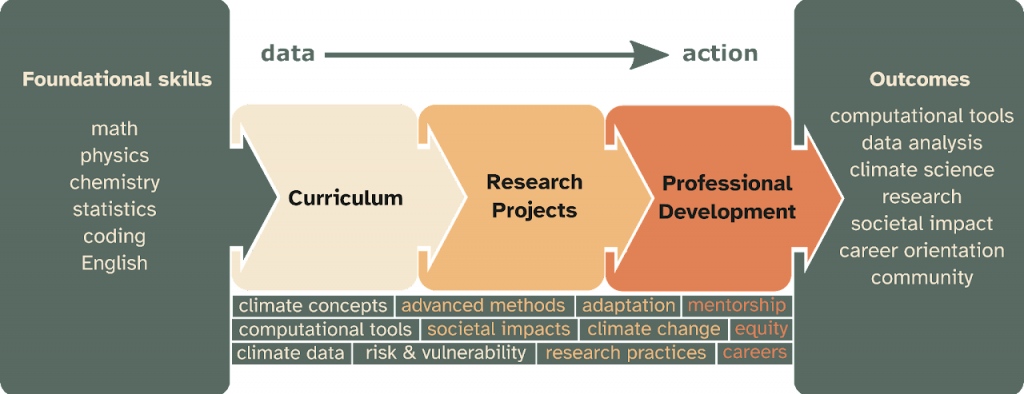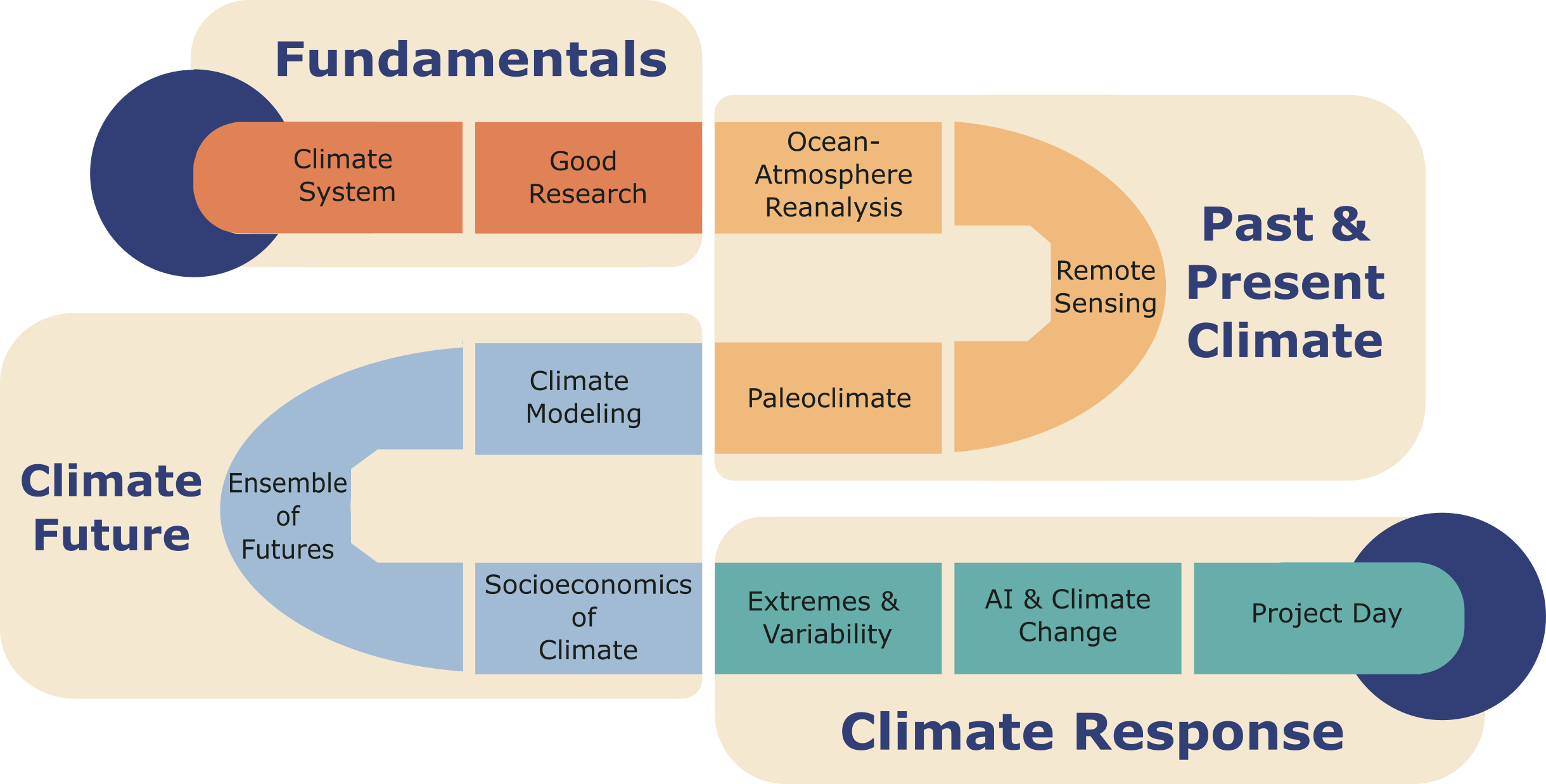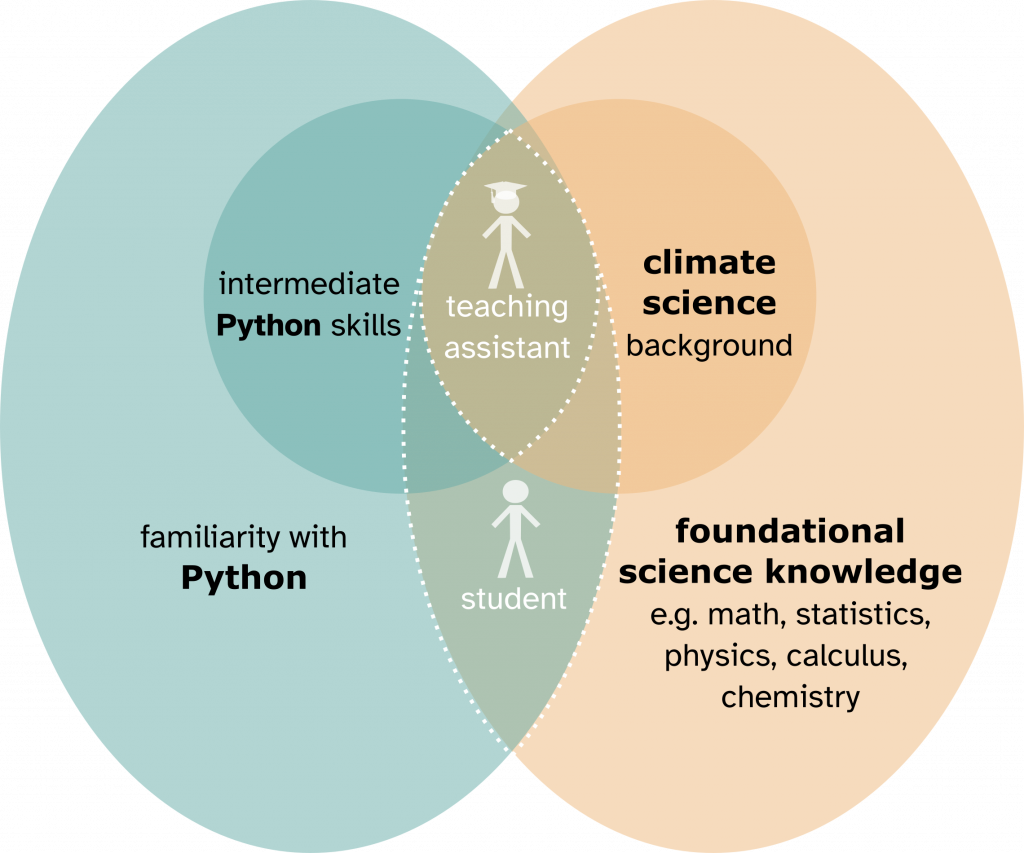Key Information on Upcoming Course Event
- Full time, 2 Week, Live Instruction Course
- July 14 – July 25, 2025
- See Courses Page for more information on tuition and course timeline.
Computational Tools for Climate Science Course
We follow the motto “From Data to Action”, aiming to grow and empower the global community of climate scientists.
Join our innovative online program to learn cutting-edge techniques from climate science experts, implement them in guided Python tutorials, and collaborate on team research projects using real-world and modeled data to explore the social and environmental effects of climate change.
All our content is open source, feel free to browse our course book or the content used to create it.

Pre-Course Preparation
Students should have foundational skills in math, physics, statistics, chemistry, and Python. For a comprehensive list of prerequisites, along with links to materials for skill review, please refer to the full guide here. We highly recommend reviewing these resources, particularly if you need a refresher on Python.
Course Curriculum
The first day of the course curriculum will provide an overview of the climate system and Xarray.
The next three days are centered on climate data. Students will use reanalysis products, remote sensing data, and paleoclimate proxy data to understand multi-scale climate interactions, climate monitoring, and variations in past marine, terrestrial, and atmospheric climates.
This will be followed by an introduction to the future of the climate system. Students will learn about climate models, how to interpret their projections of future climate and explore the socio-economic pathways that shape climate risks.
Finally, the course will cover the responses to climate change, including extreme climate events (e.g. precipitation patterns, heatwaves), and the application of AI techniques to develop predictive models that enhance our understanding of and ability to anticipate the effects of climate change.
The last day of the course will be a Projects Day, where students will finalize their research projects using real-world and modeled data, and give their final presentations. There will be no tutorial time on this day.

Research Projects
To help students gain confidence in applying their newly acquired knowledge, they will work in small project groups (6-8 students) to pursue research questions related to a project topic that aligns with their interests. These projects will provide an opportunity to analyze climate data, either by exploring a specific physical Earth system in depth or by assessing the socio-economic impacts of climate change. Each group will focus on one of the topics outlined in the figure below, with detailed descriptions provided in the following paragraphs.
Research Project Topics
- Heatwaves
- Precipitation Variability and Extreme Events
- Ocean Acidification

Professional Development
As a part of their journey in Climatematch Academy, students and teaching assistants will be able to participate in professional development activities.
First, there will be Impact Talks on 1) climate justice, 2) equity in climate science, 3) open climate science, or 4) climate science communication. Pods will pick one, followed by facilitated group discussions.
Pricing
We offer regionally adjusted fees for our course. Please see our courses page for more information and to estimate your cost.
Dates
Our live course runs annually in July.
Student and Teaching Assistant Roles
These roles are also outlined on our general courses page and in our Portal.

Students
Students have some experience with Python and have a foundational science background that is not necessarily in climate. Students work in small learning groups (“pods”) to complete coding tutorials and develop a research project – all under the guidance of our teaching assistants.
Teaching Assistants
Teaching assistants have some knowledge of climate science and are experienced in Python. Teaching assistants guide students through tutorials and help them develop projects. As part of the application for teaching assistants, you are required to make a 5-minute video using a pre-made tutorial (longer videos will be penalized). We want as many qualified teaching assistants as possible. Our best advice is to let your personality shine through and take your time moving through the material. This will ensure the content is clear and easy to follow. Please follow this link to the instructions on what to include in your video as well as detailed recording instructions.
Teaching assistants are paid, full-time, temporary, contracted roles. TA compensation is provided by this calculator.
Apply
Applications are closed for 2025. Join our mailing list to be the first to hear about our 2026 courses.
Applications generally open five to six months before the course date. To check your registration status and submit an application, visit our Portal, make a profile, and then apply for our course if it is available.
